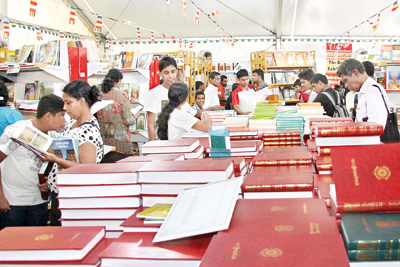Books are still alive and kicking!
The debate rages worldwide – is digital killing print media? Will this generation witness the extinction of the book? Whatever the case may be in other parts of the world, a stroll through this year’s Colombo International Book Fair reassures us that print is not dead yet. At least, not in Sri Lanka.
The Colombo International Book Fair, organised by the Sri Lanka Book Publishers’ Association, has returned for the 17th time to the BMICH and is as big and vibrant as ever.

Something for everyone: Eager visitors at the book fair. Pic by Indika Handuwala
Everyone from schoolchildren to grandparents, young professionals to clergy and even a few foreigners it seems is here, making their way through the hundreds of book stalls perusing, discussing and buying books.
Three ladies with a precarious stack of books between them draw our attention as we walk past. It turns out they are shopping for the Airport and Aviation Seva Vanitha Library for which they buy about 700 books from the book fair each year.
We stop by the Without Borders stall to add a sentence to Yohana’s story written by visitors to the fair in Sinhala, Tamil, English and even Maldivian! This book, along with two others, will later be auctioned to raise funds for an IT facility in Avissawella.
We also bump into a Catholic priest at the Buddhist Cultural Centre stall who tells us he is a regular visitor to the book fair and always buys a few books from this stall each year. Rev. Fr. Lionel Fernando runs a few libraries for children in his parish and comes especially to buy books for his enthusiastic little readers. “I believe, in reading, children can inherit a world they have not inherited in reality,” said Fr. Lionel.
There is certainly an encouraging amount of children and young people walking around which suggests reading is still popular with the younger generation.
Although uniform clad students flock to the education stalls, most also wander to other sections of the fair and invariably leave with more bags full of books. A/L student Ushan Sakuntha is here with his friends and believes the book fair’s popularity will continue.
Grade 12 student Shenaya Jayaweera, however, came without her friends who weren’t so keen on the crowds. It’s her first time at the fair and Shenaya too believes print can survive the digital revolution because “you can’t compare anything to books.”
The general consensus amongst publishers and buyers alike seems to be that crowds have increased this year.
“I think there has been a shift in Sinhalese readers to looking for novels with literary value rather than mediocre fiction,” said Eshara Piyadarshani. Jayantha Jayakody of Sooriya Publishers tells us that while Sinhala writers are popular, the larger appeal is for translations.
However, “this has always been the case,” he adds,“translations of books about Sri Lanka by authors such as R. L. Spittel remain bestsellers to this day.”
Preference for international over local seems to apply to English language publications as well, as Sam Perera of Perera-Hussein Publishing House tells us he had a few people walk out disappointed when they found out Perera-Hussein only sold books by Sri Lankan authors.
Nevertheless, he points out that “everyone has a bag of books”, which speaks for the positive impact of the book fair on society. According to the Ministry of Finance Mid-year Fiscal Report, the nation’s computer literacy has risen to 25% as of 2014 and 16 per every 100 persons now have access to internet. Add to that talk of free Wi-Fi island-wide by 2016 and prospects look uncertain for print in the long-run.
The challenge for future book fairs, then, will be in adapting to the new market while keeping alive the spirit of the fair, which is really a celebration of reading.
Today is the final day of the Colombo International Book Fair which is open from 9 a.m. – 9 p.m. at the BMICH.


